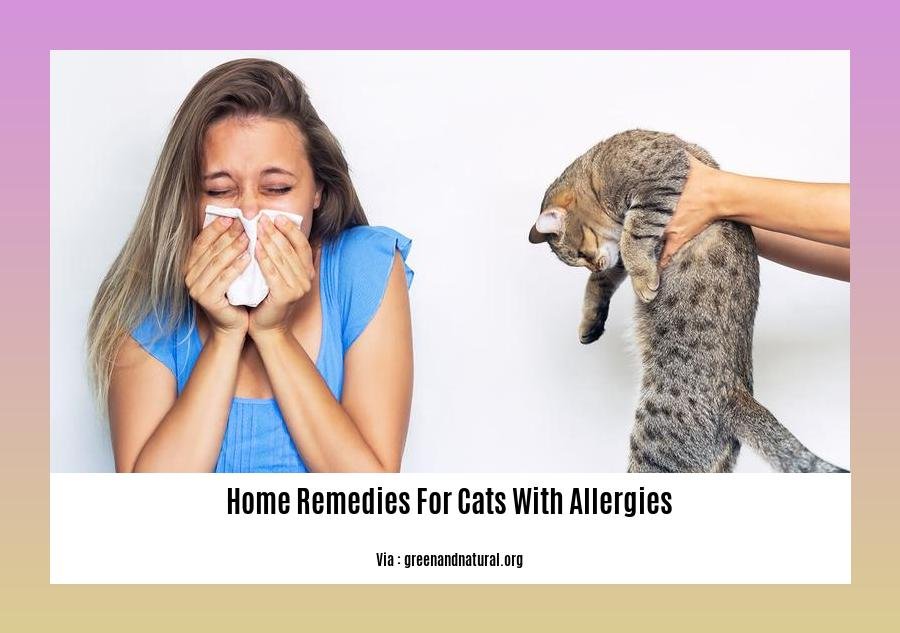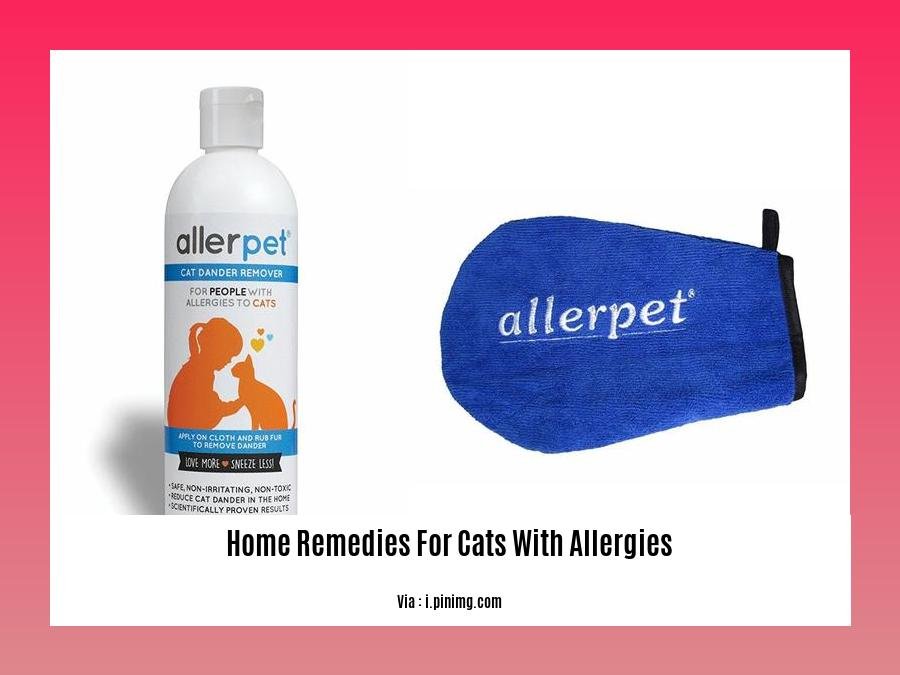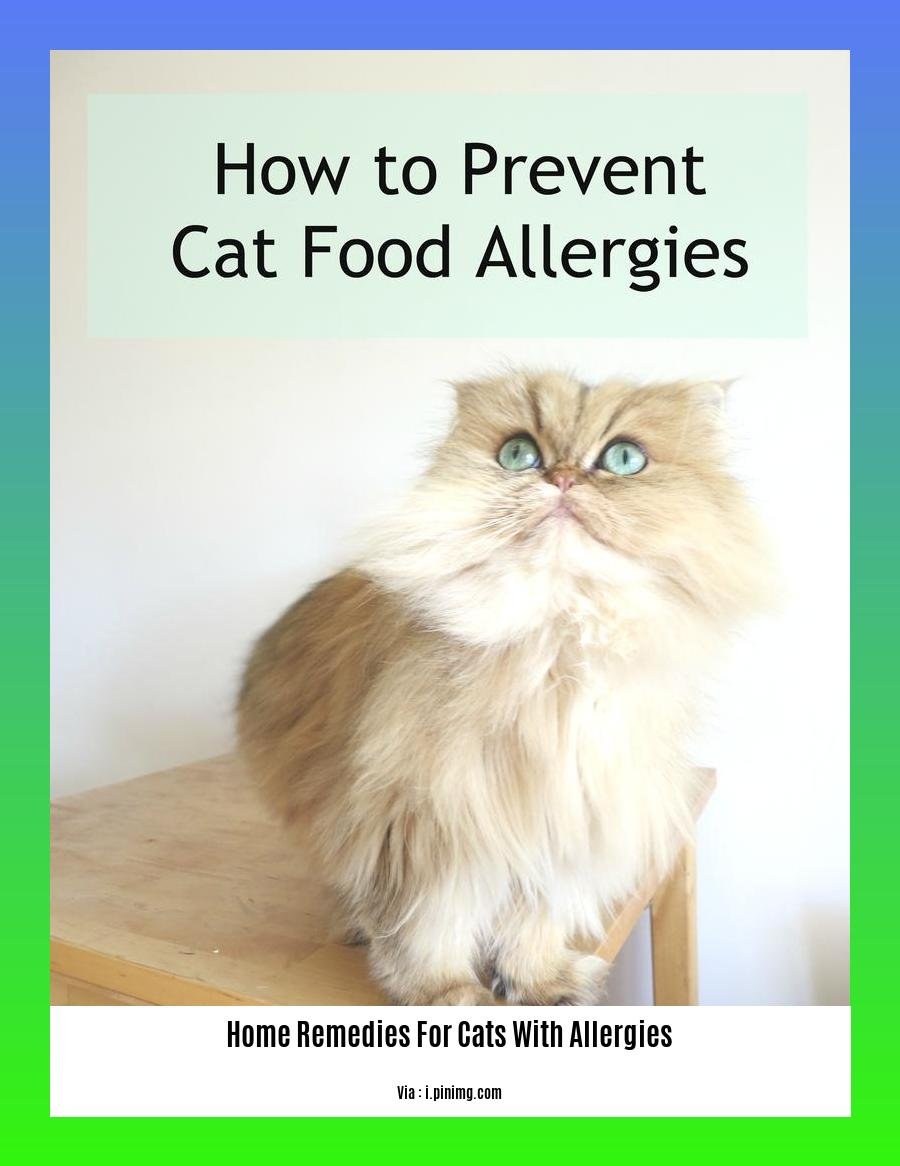[Home Remedies for Cats with Allergies: Natural Relief for Your Feline Friend]: Explore effective natural remedies to alleviate your cat’s allergy symptoms, promoting a healthier and happier life for your feline companion.
Key Takeaways:
- Coconut Oil: Apply internally and externally to moisturize and reduce inflammation.
- Omega-3 Fatty Acids: Boost the immune system and combat allergies.
- Evening Primrose: Soothe itching and irritation when applied directly to the skin.
- Acidophilus: Balance gut flora and prevent allergic reactions.
- Bathing: Remove allergens from fur and skin.
- Discontinue Plastic Bowls: Prevent bacterial buildup and allergic reactions.
- Oatmeal Soak: Calm skin inflammation and provide relief.
Home Remedies for Cat Allergies: Natural Relief for Your Feline Friend

As a cat owner, witnessing your beloved pet struggle with allergies can be disheartening. While veterinary care is crucial, home remedies for cat allergies can provide additional comfort and relief. These natural solutions, when used in conjunction with professional guidance, can help alleviate your cat’s discomfort and improve their quality of life.
1. Coconut Oil: Nature’s Multipurpose Healer
- Its Moisturizing Touch: Apply coconut oil topically to soothe dry, itchy skin, reducing inflammation and promoting healing.
- Internal Benefits: Add a teaspoon of coconut oil to your cat’s food daily to improve skin and coat health from within.
- Flea Allergy Relief: Coconut oil’s anti-inflammatory properties help combat flea allergy dermatitis.
2. Omega-3 Fatty Acids: Boosting the Immune System
- Dietary Sources: Introduce foods rich in omega-3 fatty acids, like salmon, sardines, and flaxseed oil, to strengthen your cat’s immune response against allergies.
- Immunity Booster: Omega-3s support a healthy immune system, reducing the severity and frequency of allergic reactions.
3. Evening Primrose: Soothing Itch and Irritation
- Topical Application: Apply evening primrose oil directly to affected areas to calm itching and irritation.
- Internal Support: Evening primrose oil supplements can provide internal relief, reducing overall allergy symptoms.
4. Restoring Balance with Acidophilus
- Gut Microbiome Harmony: Acidophilus, a probiotic, helps maintain a balanced gut microbiome, reducing the likelihood of allergic reactions.
- Digestive Support: Acidophilus promotes healthy digestion, improving nutrient absorption and overall well-being.
5. Bathing: A Clean Escape from Allergens
- Regular Bathing Routine: Bathe your cat every 1-2 weeks using a gentle, fragrance-free shampoo to remove allergens and dirt from their fur and skin.
- Allergen Rinse: Rinse your cat thoroughly to ensure no soap residue remains, as it can irritate their skin.
6. Plastic Bowls: A Breeding Ground for Allergies
- Ditch the Plastic: Replace plastic food and water bowls with stainless steel or ceramic alternatives to prevent bacterial growth and potential allergic reactions.
- Hygienic Maintenance: Wash bowls daily with hot water and soap to maintain cleanliness and prevent allergen buildup.
7. Oatmeal Soak: A Calming Relief
- Oatmeal’s Soothing Properties: Create an oatmeal soak by blending oatmeal into a fine powder and adding it to warm water.
- Itch Relief: Gently apply the oatmeal mixture to affected areas to soothe irritation and itching.
- Rinse Thoroughly: Rinse your cat thoroughly after the soak to remove any remaining oatmeal.
-
Struggling to find the perfect gift for a stay-at-home mom? Discover our curated selection of best gifts for stay at home moms, tailored to make her life easier and more enjoyable.
-
Is your dog suffering from itchy skin? Explore our comprehensive guide to dog skin problems home treatment, offering natural and effective solutions to relieve your furry friend’s discomfort.
-
Craving authentic Southern cuisine? Down home restaurant menu featuring mouthwatering dishes prepared with fresh, local ingredients, awaits your taste buds.
-
Concerned about your cat’s cold? Find relief with our collection of home remedies for cats with colds, offering gentle and effective ways to soothe your feline’s symptoms and promote recovery.
Herbal Remedies for Allergy Relief

Do you have a cat that suffers from allergies, making them itchy, sniffly, and uncomfortable? If so, you’re not alone. Many cats struggle with allergies, and while there’s no cure, there are natural remedies that can help alleviate their symptoms and improve their quality of life.
Herbal remedies have been used for centuries to treat a variety of ailments, including allergies. They’re a natural way to help your cat feel better without the use of harsh chemicals or medications. Here are a few popular herbal remedies that may help relieve your cat’s allergy symptoms:
Pine Bark Extract:
This natural antioxidant and antihistamine can help reduce inflammation and the body’s response to allergens. It’s available in supplement form and can be given orally to your cat.
Apple Cider Vinegar:
Apple cider vinegar has antibacterial and anti-inflammatory properties that can help reduce allergy symptoms. You can add a small amount to your cat’s food or water, or apply it directly to the affected area.
Coconut Oil:
Coconut oil is a natural anti-inflammatory and can help soothe dry, itchy skin. It can be applied topically to the affected area or added to your cat’s food.
Quercetin:
This flavonoid has anti-inflammatory and antihistamine properties that can help reduce allergy symptoms. It’s available in supplement form and can be given orally to your cat.
Nettle:
Nettle is a natural antihistamine and can help reduce inflammation. It’s available in supplement form or can be brewed into a tea and given to your cat.
Key Takeaways:
- Herbal remedies can be a safe and effective way to alleviate your cat’s allergy symptoms.
- Always consult with your veterinarian before giving your cat any herbal remedies, as some herbs can be toxic to cats.
- Start with a small dose and increase it gradually to avoid any adverse reactions.
- If your cat’s allergy symptoms are severe, you may need to combine herbal remedies with other treatments, such as medication or allergy shots.
Relevant Sources:
Dietary Modifications to Reduce Symptoms
If your feline friend suffers from allergies, making some dietary changes can help alleviate their symptoms and improve their overall well-being. Here are some effective dietary modifications that can help:
Key Takeaways:
- Omega-3 Fatty Acids: Boost your cat’s immune response by adding foods rich in omega-3s, like salmon and tuna, to their diet.
- Prebiotics and Probiotics: Support a healthy gut microbiome by introducing prebiotic and probiotic supplements or foods like yogurt and kefir.
- Anti-Inflammatory Foods: Offer anti-inflammatory foods like blueberries, turmeric, and green leafy vegetables to reduce allergy-induced inflammation.
- Avoid Allergens: Identify and eliminate food allergens by conducting an elimination diet or consulting a veterinarian for allergy testing.
- Limited Ingredient Diet: Opt for a limited ingredient diet or hydrolyzed protein food to minimize the risk of allergic reactions.
1. Omega-3 Fatty Acids:
Omega-3 fatty acids, found abundantly in fish like salmon and tuna, are known for their anti-inflammatory properties, which can help reduce allergy symptoms in cats. Incorporate these foods into your cat’s diet regularly to boost their immune response.
2. Prebiotics and Probiotics:
A healthy gut microbiome can help reduce allergic reactions. Introducing prebiotic and probiotic supplements or foods like yogurt and kefir into your cat’s diet can help maintain a balanced gut flora and support overall well-being.
3. Anti-Inflammatory Foods:
Certain foods possess anti-inflammatory properties that can help alleviate allergy symptoms. Offer your cat blueberries, turmeric, and green leafy vegetables to reduce inflammation and improve their comfort.
4. Avoid Allergens:
Identifying and eliminating food allergens can significantly reduce allergy symptoms in cats. Conduct an elimination diet, gradually removing potential allergens from their diet, or consult a veterinarian for allergy testing to determine the specific allergens your cat is reacting to.
5. Limited Ingredient Diet:
If your cat has severe allergies, consider switching to a limited ingredient diet or hydrolyzed protein food. These diets contain a limited number of ingredients, reducing the risk of allergic reactions and making it easier to identify potential allergens.
Conclusion:
Dietary modifications can be a powerful tool in managing cat allergies. By incorporating omega-3 fatty acids, prebiotics, probiotics, anti-inflammatory foods, and avoiding allergens, you can help reduce your cat’s allergy symptoms and improve their quality of life. Always consult with your veterinarian before making significant changes to your cat’s diet to ensure their nutritional needs are met.
Relevant Sources:
- The Best Way to Get Rid of Cat Allergies Naturally
- Natural Remedies for Pet Allergies
Providing a Hypoallergenic Environment
Do you think you can’t have a cat because of allergies? On the contrary, you can! Creating a hypoallergenic home environment lets you bring a furry friend into your life without compromising your health.
Key Takeaways:
-
Regular Cleaning: Vacuum and dust your home frequently to remove cat dander and allergens. Remember to clean under furniture and in corners where cats like to hide.
-
Minimize Cat Access: Restrict your cat’s access to certain areas, such as your bedroom, where you spend a lot of time. This helps reduce allergen exposure.
-
Air Purifiers: Use HEPA filters in your air conditioner or air purifier to trap and remove airborne cat allergens.
-
Bathing and Grooming: Bathe your cat every 1-2 weeks with a gentle, fragrance-free shampoo. Regular brushing helps remove loose dander and hair.
-
Hypoallergenic Bedding: Invest in hypoallergenic bedding, including pillow covers and mattress protectors, to reduce allergen buildup. Wash your bedding frequently in hot water.
-
Designated Cat Areas: Create a designated area for your cat to eat, sleep, and play. Keep these areas clean and free of clutter.
-
Reduce Fabric Surfaces: Eliminate or minimize fabric surfaces, such as carpets and curtains, as they trap dander and allergens. Opt for hard floors and furniture that’s easy to clean.
-
HEPA Vacuum Cleaner: Use a HEPA-filtered vacuum cleaner to thoroughly clean your home and effectively remove allergens.
Sources:
The Best Way to Get Rid of Cat Allergies Naturally
Hypoallergenic Cats: Do They Exist? — Get the FUR DOWN!
FAQ
Q1: What are some effective home remedies for cats with allergies?
A1: Home remedies for cats with allergies include coconut oil for moisturizing and reducing inflammation, omega-3 fatty acids for boosting the immune system, evening primrose for soothing itching and irritation, acidophilus for balancing gut flora, and oatmeal soaks for calming the skin and reducing inflammation.
Q2: How can I reduce cat allergens in my home?
A2: To reduce cat allergens in your home, bathe your cat regularly to remove allergens from the fur and skin, discontinue the use of plastic bowls as they can harbor bacteria, and consider an oatmeal soak to calm the skin and reduce inflammation related to allergies.
Q3: What are the benefits of coconut oil for cats with allergies?
A3: Coconut oil has multiple benefits for cats with allergies. Its internal and external application moisturizes the skin and reduces inflammation. Additionally, its antioxidant properties prevent cell damage and repair dry, itchy skin caused by allergies, and it effectively curtails allergic reactions to fleas.
Q4: How does evening primrose help cats with allergies?
A4: Evening primrose directly applied to the skin alleviates itching and irritation associated with allergies in cats. Its anti-inflammatory properties help soothe the skin, reducing discomfort and improving the overall well-being of the cat.
Q5: What is the role of acidophilus in managing cat allergies?
A5: Consuming acidophilus helps balance the gut flora and prevent allergic reactions in cats. Acidophilus is beneficial for maintaining a healthy digestive system, which plays a crucial role in supporting the immune system and reducing the likelihood of allergic reactions in cats.
- Upgrade Your Table Setting: Best Salad Forks 2025 - June 26, 2025
- Sage Green Throw Pillows: Transform Your Home Decor - June 26, 2025
- Find the Perfect Sage Green Rug: A Buyer’s Guide - June 26, 2025










